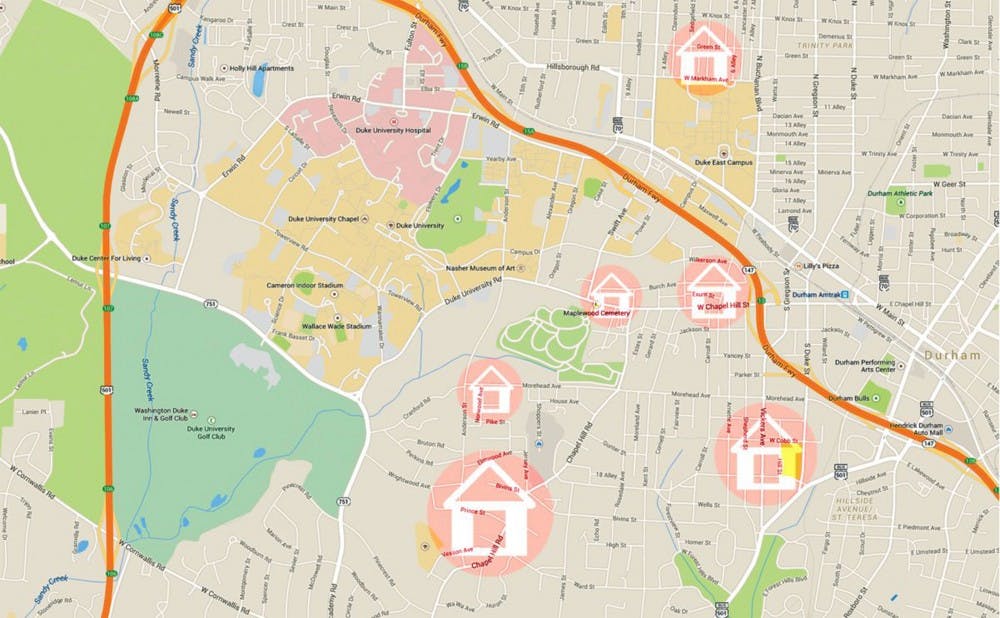Durham residents have voiced complaints regarding Duke and the city of Durham’s efforts to prevent off-campus fraternity parties from disrupting communities.
In response to these disruptions, Durham Neighborhoods United has advocated for stricter enforcement of city ordinances applicable to fraternity houses and for the University to proactively address the issue. The group currently has a protocol directing community members to call representatives from the University, city and Durham Police Department to voice complaints, but these measures have not put a stop to the problem, said Alisa Johnson, English professor at Meredith College and one of DNU’s leaders.
“The parties involve alcohol, a lot of women and they shriek and scream and yell loudly,” said Kay Robin Alexander, Trinity ‘83. “The worst part is, sometimes after the police come and break up the parties, they’re out on the street making noise.”
Duke’s response
After receiving a complaint, representatives from the Dean of Students Office visit the houses in question and warn students that multiple complaints could lead to a disciplinary process, wrote Leslie Grinage, assistant dean of students, in an email.
The University also has a “Knock and Talk” program during the first week of each Fall semester. Staff from the Office of Student Affairs and the Duke University Police Department visit houses where students typically reside in order to “share University expectations for living in the community,” Grinage wrote.
She noted that the University supports DNU’s protocol and regularly sends representatives to the group’s meetings.
Johnson acknowledged that the University’s response time has improved, but added that the “Knock and Talk” program and visits to houses after receiving complaints have not fixed the problem. However, noise levels and party frequency have decreased at some houses, Johnson said.
“It stops for a while, and it springs back up,” she said. “None of the knock-and-talks seem to have been enough to convince students to look for other venues for parties.”
Duke has taken action on similar issues in the past. In 2006, the University bought “party houses” located near East Campus and resold them to be used as single-family homes, said Jeffrey Potter, director of real estate administration.
Despite these efforts, some members of DNU have pointed to specific Duke policies as contributing to the persistence of off-campus disruptions.
“I graduated from Duke in 1983, when there were still kegs on the quad at least four nights a week, every week,” Alexander noted. “In other words, the University had not yet pushed the ‘problem’ of student drinking off-campus.”
City Council member Don Moffitt added that one potential policy change could be the institution of a “recall policy,” in which off-campus students could be recalled back to campus if they were found in violation of a code of conduct. He also noted that Duke’s three-year on-campus residency requirement is a step in the right direction.
The city’s response
In addition to working with the University, Johnson said that DNU is looking into city ordinances that are applicable to off-campus fraternity houses.
Bo Dobrzenski, planning supervisor at the Durham City-County Planning Department, wrote in an email that the two ordinances most relevant to off-campus fraternity houses are found in the Unified Development Ordinance. According to the UDO, no more than three unrelated people can live in one dwelling unit, and fraternity houses are required to have a minor special use permit in order to operate.
Dobrzenski confirmed that two houses have been found illegally operating as fraternity houses but that such usage has been discontinued. He also noted that other houses with ties to fraternities that have chapters at Duke have been investigated.
The city often “struggles to be effective” when investigating complaints because it is difficult to prove ordinance violations, “especially if landlords aren’t interested in the issue and students are willing to lie about it,” Moffitt said.
Having to deal with “party houses” can also be a distraction from other issues the city has to deal with, he added.
“We have a lot of other problems,” Moffitt said. “It would be great if we didn’t have to focus resources on party houses.”
Johnson noted that the deterrents in the ordinances currently are not effective enough to stop the problem, adding that DNU would like to see more aggressive enforcement of noise ordinances and underage drinking policies.
DPD has been hesitant to charge students with underage drinking due to the far-reaching consequences of a criminal citation, Moffitt explained.
Legal remedies
DNU has recently worked with the Civil Legal Assistance Clinic at the University of North Carolina at Chapel Hill School of Law to explore potential legal solutions to the group’s problems, Johnson said.
Erika Wilson, an assistant professor of law at UNC who worked with DNU at the clinic, explained that both the group itself as well as individual residents might be able to bring a private nuisance claim against the landlords or particular students for violating the legal right to enjoy their property.
Johnson said the goal of a lawsuit would not be financial recompense, but rather to get students to cease their disruptive behavior.
Although DNU does not currently have any plans to pursue legal action, Johnson said that many frustrated community members are continuing to look for potential solutions.
“This is a situation that has been ongoing, and there are a lot of people who are deeply disturbed by it,” she said. “Legal remedies are there as a potential way to push it to a head. It wouldn’t surprise me as we move forward if we see a lot of people come up with creative ways to sue around this issue.”
The Office of Fraternity and Sorority Life and senior Max Schreiber, president of the Interfraternity Council, declined to comment on the issue. The Chronicle spoke with Alexander by phone and by email.

